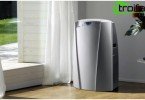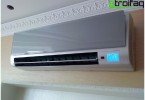How to choose an air conditioner
The peak of sales of air conditioners, fans, humidifiers and other household appliances to maintain a comfortable indoor microclimate is, naturally, at the time of a debilitating sun when the expression “brain melts” is close and understandable to everyone. In an effort to find the long-awaited comfort, the afflicted, with a rather vague idea of how to choose an air conditioner, study the assortment of household appliance stores, seek advice from sales consultants and compare prices. The sellers, in turn, are cautiously interested in the amount that the buyer is willing to spend and, on the basis of the data received, feel free to advise which air conditioner is better to choose, colorfully painting the advantages of a device of a suitable price category, preferring to remain silent about the flaws, so that the carelessly dropped word does not affect the choice of air conditioning.
All these games of commodity-market relations for a simple layman turn into a successful or unsuccessful (which is much more likely) purchase. Only a comparison of the parameters of the device with the necessary, desired functions with real ones will help to figure out which air conditioner to choose among the variety of assortment of household appliances stores. Consider the main features of various types of air conditioners, so that the selection of the air conditioner was conscious and balanced.
Content
- Types of domestic air conditioners
- Window air conditioners
- Floor air conditioners
- Classic split system
- Inverter Split System
All air conditioners can be conditionally classified by area of application, highlighting industrial air conditioning systems, domestic, as well as semi-industrial air conditioners. Devices with a cooling capacity of 1.5-8 kW belong to the group of domestic air conditioners, they are used to normalize the microclimate in individual rooms of apartments or cottages with an area of up to 100 m2. In everyday life, both stationary and portable models are used. There are several types of air conditioners with different designs, characteristics and principles of operation.
Types of domestic air conditioners
- Monoblock (window, floor).
- Split systems (wall type, fixed multi split systems)
Window air conditioners
Window air conditioners are installed in a wooden casement window. Installation does not require the use of expensive equipment, it can be done with your own hands. Due to poor sealing in the winter, such devices can pass cold air, in addition, they are quite noisy in operation.
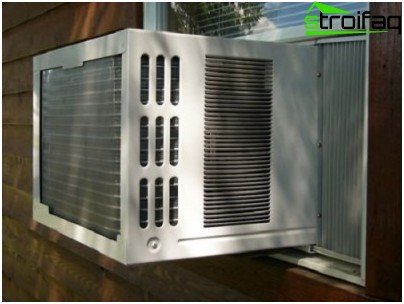
The entire air conditioning system is contained in one unit, which greatly simplifies the installation of a window air conditioner
Floor air conditioners
Mobile type air conditioners (also called “floor”) are installed indoors, usually equipped with wheels, they can be moved. They contain both a compressor and a heat sink. Warm air is vented out the window through a hose. Such devices are usually characterized by a high noise level..
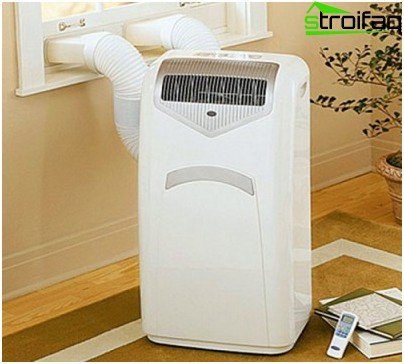
The choice of a floor air conditioner is advisable if it is necessary to maintain an optimal microclimate in a small room
Classic split system
The split system consists of an outdoor unit and connected to it using copper tubes and wires of the indoor unit. The multi split system consists of one outdoor unit and several indoor units connected to it (from 2 to 6). The classic split systems are low noise, at maximum power they catch the required temperature, when the air heats up again – they resume efforts. Phased operation at maximum power is effective, but energy-consuming enough.
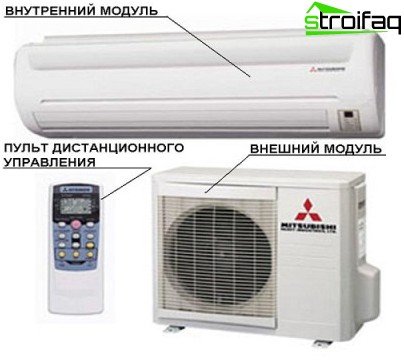
It is this type of air conditioner that is most in demand in the modern market, due to work efficiency, ease of maintenance and operation
Inverter Split System
Such a split system is distinguished by the non-stop operation of the compressor. The temperature in the room is regulated by changing the power of its work, which saves energy and helps to extend the service life. Compared to a conventional air conditioner, energy savings are around 40%. In winter, conventional split systems may fail due to freezing of outdoor units. Inverter split systems, the temperature limit for efficient operation is much higher.
Tips for choosing an air conditioner
On the market today there are air-conditioners of economy class, middle price category and elite, excellent in a number of characteristics, equipped with additional functions. The question in the manner of “how to choose the right conditioner among all this splendor” is not so difficult to resolve. Most importantly, compliance with needs. To maintain a comfortable microclimate, an air conditioner of medium or economy class may be sufficient (depends on the required power). Multiple air filtration (can be useful prone to allergies), protection against drafts (relevant if the house has children or colds prone to adults), air heating (especially convenient in the off-season) – these and other additional features complement the list of standard functions of prestigious elite air conditioners brands.
Often reflecting on the topic “which brand air conditioners to choose”, the user learns the characteristics and selects a particular model as a favorite. Then the question is modified, it takes the wording in the manner of “which company to choose the air conditioner from” and in search of the best deal it stops at a small online store offering the model you like at a substantial discount. Indeed, this way you can save money, but there is a high risk of default by the company of further warranty obligations. In the case of a purchase at a large household appliance store, the buyer receives not only installation services, but also guarantees of equipment maintenance.
The choice of air conditioner by area is as follows: on average, 1 kW of cooling power falls on 10 m2 of area, the ceiling height, the number of people constantly in the room, and also the heat from the operation of household appliances (TV, computer) should be taken into account.
Often, in an attempt to improve the microclimate of the entire apartment, the user does not think of anything better than choosing the power of an air conditioner several times higher than required, in the hope that a powerful device will provide comfort over a larger area. In fact, the temperature sensor will react when the specified level is reached and the room will stop cooling. Remember that each room requires a separate air conditioning..


